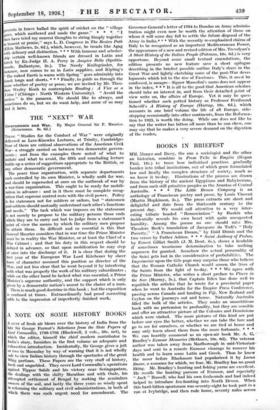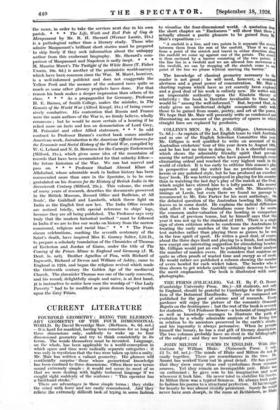BOOKS IN 'BRIEFEST
MM. MonET and Davy, the one a sociologist and the other an. historian, combine in From Tribe to Empire (Kegan Paul, 16s.) to trace how individual practices gradually harden into tribal institutions, out of which grow formulated law and finally the complex structure of society, much as we know it to-day. Illustrations of the process 'are drawn from the history of the ancient Egyptians and Babylonians, and from such still primitive peoples as the Aruntas of Central Australia. * * * The Little Brown Company is an anthology of Franciscan poetry and prose, by Louis Vincent (Martin Hopkinson, 5s.), The prose extracts are short and delightful and date from the thirteenth century to the present day. We would call attention to a very inter- esting tribute headed " Renunciation " by Ruskin who incidentally reveals his own heart with quite unexpected humility. Among the poems no one should miss Mrs. Theodore Beck's translation of Jacopone da Todi's " Holy Poverty," " A Franciscan Dream," by Enid Dinnis and the two verses by Father Adrian. * * * Saint Anthony of Padua, by Ernest Gilliat Smith (J. M. Dent, Os.), shows a laudable if sometimes wearisome determination to take nothing unproven for granted. Somehow the actual personality of the Saint gets lost in the consideration of probabilities. The Imprimatur upon the title page may surprise those who believe that the Roman Catholic Church would screen the lives of the Saints from the light of to-day. * * * We agree with the Prime Minister, who writes a short preface to Places in the Sun (Murray, 5s.), that Captain Eden has done well to republish the articles that he wrote for a provincial paper when he went to Australia for the Empire Press Conference, passing across Canada and landing in Fiji, New Zealand and Ceylon on the journeys out and home. Naturally Australia filled the bulk of the articles. They make an unambitious book with no pretension to 'profundity, but they are sensible and offer an attractive picture of the Colonies and Dominions which were visited. The more pictures of this kind are put before our eyes the better, whether we can take the lure and go to see for ourselves, or whether we are tied at home and may only learn about them from the more fortunate. * * * We can heartily commend as an open-air book Mr. A. GI, Bradley's Exmoor Memories (Methuen, 10s. 6d). The veteran author was taken away from Marlborough in mid-Victorian-- days and sent to a remote Exmoor vicarage to recover his health and to learn some Latin and Greek. Thus he knew the moor before Blaclunore -had popularized it by Lorna Doane, a romance for which, we fear, Mr. Bradley has no great liking. Mr. Bradley's hunting and fishing yarns are excellent. He recalls the hunting' parsons of Exmoor, and especially " Jack " Russell, who had his own foxhounds and had indeed helped to introduce fox-hunting into North Devon. When this hard-bitten sportsman was seventy-eight he took part in a run at Ivybridge, and then rode home, seventy miles across 'the moor, in order to take the services next- day-in his own parish. * * * The Life, Work and Evil Fate of Guy de Maupassant by Mr. R. H. Sherard (Werner Laurie, 21s.) is a pathological rather than a literary study. Those who admire Maupassant's brilliant short stories must be prepared • to skip freely if they seek information about the unhappy author from this exuberant 'biography. Mr. Sherard's com- parison of Maupassant and Napoleon is sadly inept. * * * M. Maurice Muret's The Twilight of the White Races (T. Fisher , Unwin, 10s. 6d:) is another of the pessimistic world-surveys which have been common since the:War. M. Muret, however, is a well'-informed publicist and doei not exaggerate the Yellow Peril and the menace of the coloured races quite so much as some other gloomy prophets have done. For that reason his book makes a deeper impression than others of its class. * * * As a propagandist for Germany, Professor H. E. Barnes, of Smith College, makes the mistake, in The Genesis of the World War (Alfred Knopf, 21s.) of being exces- sively combative. His contention that Russia and France - were the main authors of the War is, we firmly believe, wholly erroneous ; but he would be more certain of a hearing if he relied more on facts and less on denunciation of Lord Grey, M. Poincaire and other Allied statesmen. * * * In odd contrast to Professor Barnes's excited book comes another American work, Introduction to the American Official Sources for the Economic and Social History of the World War, compiled by W. G. Leland and N. D. Mereness for the Carnegie Endowment (Milford, 21s.), which gives some idea of the mountains of records that have been accumulated for that unlucky fellow— the future historian of the War. We can but marvel and pass on. * * * Professor Shafaat Ahrnad Khan of Allahabad, whose admirable work in Indian history has been commended more than once in the Spectator, is to be con- ; gratulated on his Sources for the History of British India in the Seventeenth Century (Milford; 25s.). This volume, the result of many years of research, describes the documents preserved in the British Museum, Record Office and Bodleian, at All • Souls', the Guildhall and Lambeth, which throw light on India as the English first saw her. The India Office records are noticed briefly, with special reference to ships' logs, because they are all being published. The Professor says very truly That the Modern historical method " must be followed in India if we are to free our works on history from the narrow communal, religious and racial bias." * * * The Fran- ciscan celebrations, marking the seventh centenary of the Saint's death, have inspired Miss E. Gurney Salter, Litt.D., to prepare a scholarly translation of the Chronicles of Thomas of Eccieston and Jordan of Giano, under the title of The Coming of the Friars Minor to England and Germany (J. M. Dent; 5s. net). Breither Agnellus of Pisa, with Richard of Ingworth, Richard of Devon and William of Ashby, came to England in 1224, and began the religious revival which made the thirteenth century the Golden Age of the mediaeval Church. The chronicler Thomas was one of the early converts, and his record, delightfully simple and naive, is at first hand. It is instructive to notice how soon the worship of " Our Lady Poverty " had to be modified as pious donors heaped wealth upon the Grey Friars.































































 Previous page
Previous page